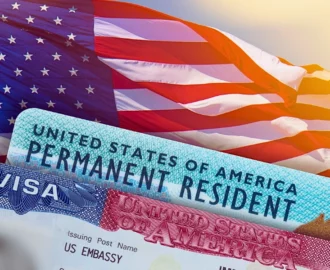Immigrants who get involved in car accidents often wonder, “does an accident case affect a visa?” It can be terrifying to think that an accident you had no control over might impact your legal status in the country. Fortunately, in most cases, an accident won’t impact your ability to stay in the country. In fact, you can even file a personal injury lawsuit, if eligible.

Visas and Immigration Law in Illinois
Effective July 1, 2024, undocumented immigrants in Illinois may obtain a four-year driving license, replacing the Temporary Visitor Driver’s License currently available to undocumented immigrants. While you don’t need a visa to get a driver’s license, it’s important to understand how immigration laws and legal issues affect immigrants living in Illinois.
Criteria for Visa Applications and Renewals
Eligibility criteria for visa applications and renewals depend on the visa you have or want to apply for.
For example, a travel visa will require proof of funds for your trip and proof of strong ties to your home country, such as employment or enrollment in a university.
On the other hand, a student visa may require proof of enrollment in a U.S. institution, while a work visa may come with requirements such as a job offer and proof of qualifications.
If you’re trying to sponsor a relative for a visa, immigration legal services attorneys can guide you through the process and requirements.
What Is the Impact of Legal Issues on Visa Status?
Legal issues may affect your visa status. For example, staying in the country unlawfully (failing to extend your visa before it expires) may lead to a removal and may even get you barred from entering the US for a while.
Certain criminal issues could also impact your visa. While minor crimes won’t, crimes that fall into the categories of moral turpitude or aggravated felony could lead to a deportation.
One of the most common immigration myths is that if you are charged with a misdemeanor, it is automatic grounds for deportation from the United States. Misdemeanors are not automatic grounds for deportation, although it is possible that they could lead to a deportation hearing, depending on the nature of the crime.
For example, in Illinois, domestic violence is a misdemeanor, not a felony. Nevertheless, spousal abuse is considered a crime of moral turpitude and can thus lead to deportation.
Crimes of moral turpitude can include fraud, assault with the intent to murder, domestic violence, and, for the purposes of our case, aggravated DUI (driving under the influence). If you were driving under the influence of drugs, the same may apply.
However, that doesn’t automatically mean that if you were driving under the influence, you will be deported.
The Impact of an Accident Case on a Visa in Illinois
Crimes of moral turpitude are not clearly defined. Thus, there is some room for interpretation. Generally, if a crime could be considered a petty offense, you would not be deported.
If you were driving under the influence but without aggravating factors, it might not qualify as a crime of moral turpitude.
For example, if you had a valid license, possessed the required insurance, had not taken drugs, and did not have a child in a car, it might not be considered an aggravated DUI, but rather a simple DUI. Those qualify as aggravating factors. Even if you were speeding and drunk, it would still be only a simple DUI if there are no other aggravating factors.
There are other factors that could cause a DUI to be considered an aggravated DUI. For example, a third DUI offense is always considered an aggravated DUI. If the DUI leads to someone’s death or even great bodily injury to another person, it is an aggravated DUI.
Even if an aggravating factor was present, if it has been five years after your entry to the United States, and this is your first crime of moral turpitude, you may be able to avoid deportation.
What Is the Role of Fault and Liability in Visa Considerations?
While drunk driving or driving under the influence of drugs may lead to a deportation hearing, simply getting into a car accident may not, even if you would be considered at fault from a personal injury perspective.
You may be charged with a misdemeanor after a car accident. For example, a hit-and-run could be charged as a misdemeanor if it only involved property damage. An accident caused by speeding may also be a misdemeanor.
What if You Were Not at Fault?
Regardless of your immigration status, you can file a personal injury lawsuit.
Many immigrants, especially undocumented ones, are fearful of filing lawsuits after a car accident case and don’t attempt to collect damages. They worry that bringing too much attention to the car accident case could somehow lead to their deportation, and they would rather stay away from the limelight.
However, you can’t be deported for filing a lawsuit, regardless of your immigration status. In fact, if the other driver is at fault, insurance companies and prosecutors are not allowed to use your immigration status against you, threaten to report you, or deny your claim based on it.
What if You Were Driving While Drunk?
It may be a simple DUI, in which case it may not affect your immigration status. On the other hand, if you recklessly endangered a child passenger, had consumed drugs such as heroin, or were driving with a suspended license, it might classify as a crime of moral turpitude. In such a case, having a lawyer by your side is critical.
Factors to Consider in Accident Cases to Minimize Visa Impact
If you were involved in an accident, there are steps you should take to minimize the impact it could have on your visa and legal status. Here are some things to keep in mind:
Maintain Legal Documentation
It’s important to maintain legal documentation. Keep all documents related to your visa in a folder, and put that folder in a safe place.
For example, if you’re here on a work visa, keep a copy of your job offer and an employment verification letter, which details your position, the start and end dates at your job, and other significant details.
If you’re here on a student visa, keep a copy of your enrollment documents, acceptance letter, and student card, as well as any other documents your lawyer recommends.
Of course, you should also keep documents such as your passport, green card, and social security card (if you have one) in a safe place. Your social security number is more important than your physical card, so write it down or memorize it. You will usually need it when opening up a bank account or getting a job.
Make photocopies of your passport, driver’s license, social security card, and other documents and keep them in a safe place as well.
Finally, it’s recommended to make electronic copies of your documents, too. You can take pictures of your documents or scan them and upload them to a safe location.
Seek Legal Advice and Guidance Throughout the Accident Case Process
Have an attorney by your side. An attorney can ensure you maintain the proper documentation and will represent you if things go south.
If you got into an accident, a lawyer can examine your case and help you understand how it might affect you. If you committed an offense that could lead to a deportation hearing, an attorney can argue your case in court and win.
It’s important to know what to ask an immigration lawyer the first time you meet with him or her. Some questions to ask include:
- How long have you been practicing?
- Are you familiar with cases such as mine?
- What are my chances of success?
- What documents do I need?
An attorney is there to help, even if you get yourself into a sticky situation. He or she will find the best path forward. It’s normal to feel anxious if you get into an accident as an immigrant, but having an attorney by your side can help facilitate the best circumstances.




